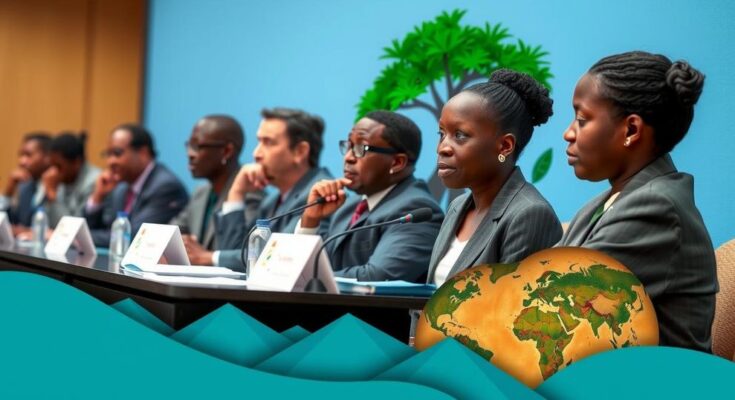COP29 failed to provide adequate climate financing for Africa, which sought $1.3 trillion per year. The agreed $300 billion per year is insufficient for climate adaptation needs. Major issues included inadequate funding, inflation risks, and geopolitical tensions. Future strategies should align Africa’s mineral resources with financial negotiations to enhance climate resilience.
The COP29 climate conference has notably disappointed African nations, as they sought a substantial annual climate financing of $1.3 trillion from developed countries, beginning in 2025. This amount is crucial for African countries to tackle climate change challenges effectively. However, the final commitment reached during the conference was only $300 billion per year, a considerable deficit regarding Africa’s needs. The disparity between what is needed and what was promised raises concerns about the continent’s ability to cope with increasing climate-related disasters.
In addition to the insufficient financing, it is anticipated that external pressures, such as inflation, could further diminish the buying power of the commitments made. For instance, if inflation averages 5% annually, the effective value of the $300 billion could significantly decrease by 2035. African representatives expressed deep dissatisfaction over the outcomes, criticizing the agreements as inadequate to meet urgent climate adaptation needs. Furthermore, the ambiguity surrounding the financing sources raises fears about increasing debt, particularly if much of the funding comes in the form of loans rather than grants.
The failure to achieve the desired support can be attributed to a multitude of factors including lobbying by fossil fuel interests who influenced discussions at high-level meetings, and geopolitical tensions which diverted focus from climate initiatives. Consequently, the climate priorities for many countries in the Global North were overshadowed by immediate political and humanitarian issues.
Looking ahead, it is crucial that African nations adopt a strategic stance in negotiations and utilize their natural resources, such as essential minerals for energy transition, as leverage for securing better financing terms. This approach aims to shift the focus of international climate discussions from mere dialogue to actionable commitments.
The ongoing climate crisis has disproportionately affected developing countries, particularly in Africa, which faces increasing challenges due to climate change. COP29 was a critical forum for African nations advocating for substantial financial assistance from developed countries to facilitate their climate adaptation efforts. The African bloc entered the conference with a lofty demand of $1.3 trillion in annual financing, align with the estimated needs stemming from climate impacts. However, the commitments made fell notably short, and this situation demands a deeper analysis of the factors at play, including geopolitical dynamics and economic considerations.
In summary, COP29 represented a missed opportunity for Africa, with the funding commitment significantly lacking compared to the $1.3 trillion required for effective climate adaptation. The outcomes reveal both the need for stronger advocacy and strategic engagement from African nations to secure the necessary financial resources. Future discussions surrounding climate finance must transform into actionable commitments, with African resources leveraged to ensure that climate discussions result in tangible support and relief for those most affected by climate change.
Original Source: www.downtoearth.org.in




